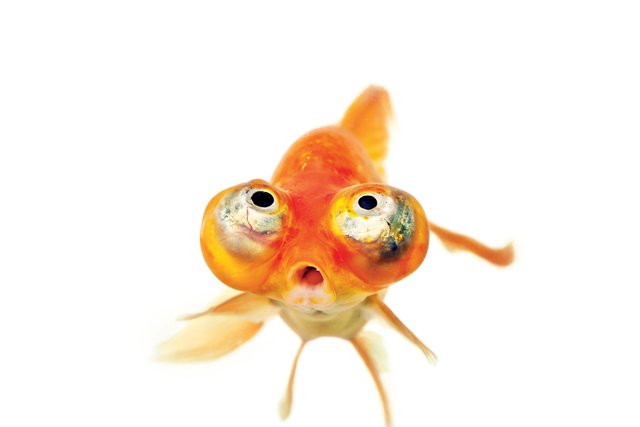Wait, You Mean... 'Spot' can JAM??

Have you ever sat, listening to music and noticed that your pet's mood, seemed to change? You listened to something that made you cry, when your cat, or dog showed a sullen, tearful eye? Was it your imagination, or does your pet really feel the music, like you do? Well, believe it or not, your pet might be jamming with you!
Various scientific studies have shown that music has a notable effect on animals. The effects of music are not exclusive to our pets, or even animals, however. The sound of music even has an effect on plants!
This reclassifies music, as a force of nature. Don't believe me? Let's introduce you to some documented scientific discoveries, and I'll prove it to you!
Exhibit 1: "The 'Classical' Rock Fish"

Above, is a crazy-eyed gold fish. This fish, clearly, was listening to something a little harder than the compositions from, Sebastian Bach, and, Igor Stravinsky, that an audience of gold fish heard, during a study at, Keio University.
The University's researchers ran a study, testing the ability of gold fish to distinguish between the two, classical composer's music. They separated the fish into two groups.
One group was given the commanding music of, Sebastian Bach, and the other group was given, Stravinsky. They would drop a food ball into the water and play the music. When the fish would gnaw on the food ball, they would be rewarded with even better food.
After some repetition, the fish would gnaw on the initial food ball, when their composer's music was played. The researchers, then switched the music, so that the group who heard Bach, now heard Stravinsky. When the music was switched, the fish, in either group did not respond to the opposite group's assigned music!
This effectively proved, that the fish could distinguish the structural differences between the two composer's music.
Exhibit 2: Chimps and Cellos

Cotton-top tamarins, are a small breed of monkey. In 2008, at the, University of Wisconsin, a biologist named, Charles Snowdon, received a call from a cellist(a cello is like a huge violin) named, David Teie. Teie, asked the biologist if he would test the effect on cello music on Snowdon's group of tamarins, at the University.
The cellist explained to the biologist, that their are certain elements to music that mirror basic biology, that is common between species. For example, the sound of a human heart, which is heard throughout our time in the womb, is found across all human music, but many other mammals, also have a heartbeat. Not, just humans. He went on, to state that there were about twelve different elements, like the heart-beat, that are used in music recipes.
Teie, speculated that animals may share some of these elements, and be effected, similarly to humans. Snowdon, agreed to the testing, and Teie's group of cellists worked to develop music that mirrored some of the sounds of the tiny tamarin monkeys.
They created music that was similar to the sounds of tamarins in distress, and they created calm music.
Once their compositions were complete, it was time to run the experiment. When they played the distressed music sounds, the monkeys responded, by shaking their heads and sticking out their tongues, among other behaviors that would usually be seen in, distressed monkeys. When the calm music was played, they were observed, calming down. The music, effected them, every time!
Exhibit 3: Milkin' M-o-0-o-zik

Got Milk? Well, evidently cows that listen to, Simon & Garfunkle's, "Like a Bridge Over Troubled Water," DO! In 2001, a study done by the, University of Leiceter, showed that cattle who listen to "Bridge Over Troubled Water," R.E.M.'s "Everybody Hurts," or, Beethoven's, "Pastoral Symphony," actually produced 3% MORE milk, than cows that didn't jam. That is almost a gallon more a day!
Other Examples:
- Dogs have shown decreased stress, when listening to calm music, and increased stress, when listening to things like heavy-metal. The effects of music on canines, is very similar to music's effect on humans.
- Cats are somewhat indifferent, or unaffected, by human music. They are effected, however, by music that imitates kitty sounds. Younger cats are more effected by this than older cats.
- Plants have been shown to have increased growth, when surrounded by the sounds of classical music. Researchers in South Korea, tested this on their rice crops. They saw increase in growth genes in their crops, after playing Beethoven through loudspeakers, over their plants.
I hope this contribution from, EMpathways Writing Community (hosted by @badseedalchemist and @audiefaith,) was informative and fun!
Please, come join our community, review our goals, and if you like it.... JOIN US! This is EMpathways Writing Community! A community for sharing professional quality, passionately written work! Read our rules, and post in our tag #hive-177757!
Thanks for reading!
-Article by Jonathan Caleb Williams @badseedalchemist, (EMpathways Writing)

Dog Image Source
Fish Image Source
Monkey Image Source
Cow Image Source
This post earned a total payout of 4.844$ and 2.422$ worth of author reward that was liquified using @likwid.
Learn more.
I, totally agree that music has a great role in the life of all living beings, directly or indirectly. your article is worth reading.